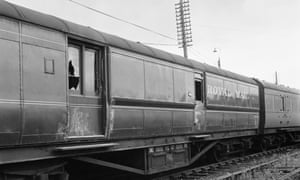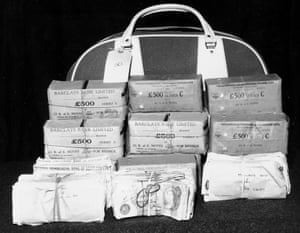Who was the mastermind? Who were the ones who got away? And why do we still want to know? Nearly 60 years after the Great Train Robbery, fresh claims are being made about who planned it and who were the robbers who were never caught. Never mind whodunnits; there’s now a genre of whoreallydunnits.
A book published this week, written by a former British Transport police detective with the help of one of the robbers, will claim that the mastermind of the heist was the late gangster Billy Hill, and that one of the team who got away with it was a relative of an Arsenal and England football player. It will also suggest that the person named recently as the “real” inside man was, in fact, a blameless postman. Already some of the new claims are being challenged by relatives of the men named.
The new book, Great Train Robbery Confidential, is the latest to look into the heist, on 8 August 1963, in which £2.5m was stolen from the Glasgow to London Royal Mail train. It is generally believed that at least 15 men took part in the robbery; only 11 were convicted.
There have been more than 40 books on the subject, not to mention films, television dramas and documentaries, many seeking to establish who the men were who never got their collars felt for the crime and dodged 30-year prison sentences. Moreover, they wonder, was there a mastermind who was never identified?
Graham Satchwell believes the answer is yes. The former detective superintendent is the author of the latest book, written with the cooperation of the train robber Tommy Wisbey, who died in 2016. Satchwell points the finger not at Bruce Reynolds, as generally accepted, but Hill, the leading London gangster of the 1950s. However, the sons of both Hill and Reynolds dismiss the idea.
“Billy knew about the robbery but wasn’t involved,” said Justin Hill. He added that the late “Mad” Frank Fraser had told him that if Hill had planned it, “no one would have been caught and the money would not have been recovered … Frank’s probably right. Dad made a point of being in Cannes when the story broke.”
Billy Hill, who died in 1984, told a reporter at the time of the robbery: “I am fucking mad about all this publicity without the money to go with it.”

Nick Reynolds, an artist and musician with the band Alabama 3 and son of one of the robbers, was also dismissive. “Bollocks,” was his response to the suggestion: “If you’ve got a book coming out, you’ve got to have something new.”
The 11 men convicted and sentenced in 1964 received terms of up to 30 years, almost double the usual penalty. The judge, Mr Justice Edmund Davies, told them it was a crime that “in its impudence and its enormity is the first of its kind in this country”.
Two of the convicted men, Reynolds and “Buster” Edwards, had already gone on the run, but waited until their associates’ appeals had been turned down before fleeing to Mexico. They eventually returned to England and served their sentences. Reynolds died in 2013. Edwards ran a flower stall near Waterloo after leaving prison and hanged himself in 1994.
Another robber, Charlie Wilson fled Winson Green in Birmingham to Canada before he, too, was returned to jail. After his release, he was shot dead at his home near Marbella in 1990 over what was believed to be an argument about drugs.
Ronnie Biggs went over the wall of Wandsworth prison in 1965, fleeing to Australia and eventually Brazil, where he was allowed to avoid extradition because he had fathered a Brazilian child. In 2001, having suffered a stroke, he returned voluntarily to England and jail. He was released in 2009 and died in 2013, his coffin accompanied to Golders Green crematorium in north London by Hells Angels.
Over the years some of the robbers, including Reynolds and Biggs, went into print themselves and in 2014 one of them, Gordon Goody, who has since died, claimed that the inside man nicknamed “the Ulsterman”, who supposedly tipped the robbers off about the money on the train, was a Belfast-born postman from Salford called Patrick McKenna who had died in 1992. The new book suggests McKenna was wrongly identified and that the notion of an Ulsterman could have arisen because an associate of Wisbey’s – also now dead – had a similar-sounding surname. In the book this character is given the pseudonym “Lenny Holstermann”.

Satchwell also puts up another name, that of Freddie Sansom, the uncle of the Arsenal footballer Kenny Sansom. Freddie died in prison many years ago, and while some members of his family think he could well have been involved, his sister, Pat, does not. Kenny Sansom told the Daily Telegraph in August “there was every chance he was part of the gang”.
Freddie Foreman, 87, the best-known surviving gangster of the era, who was offered a chance to take part in the robbery – “I knocked it back” – said he did not believe Sansom had been involved. And the suggestion of Billy Hill’s involvement? “Bollocks.”
The different theories about who the real train robbers really were now rival the number of claims surrounding the identity of Jack the Ripper, whose murders also spawned scores of books. Why this interest in the minutiae of long-past crimes?
“Transgressions are very alluring,” says forensic psychotherapist Carine Minne. “For most of us, they remain deep down and stay there…These stories, real or fiction, fascinate us as they light up the various elements that are inside us all and provide a relatively safe release for our own impulses, which is, of course, exciting and we want to know every detail, every nuance.”
As almost all of the known train robbers are now in the great open prison in the skies – only Bob Welch is still alive – it looks unlikely that the full story will ever be known. Perhaps what should – but won’t – be the last words on the saga were written 20 years ago by Bruce Reynolds, previewing a Channel 4 documentary on the robbery for the Guardian: “Some secrets will never be revealed and the full definitive history of the Great Train Robbery will never be written.”
Source link


